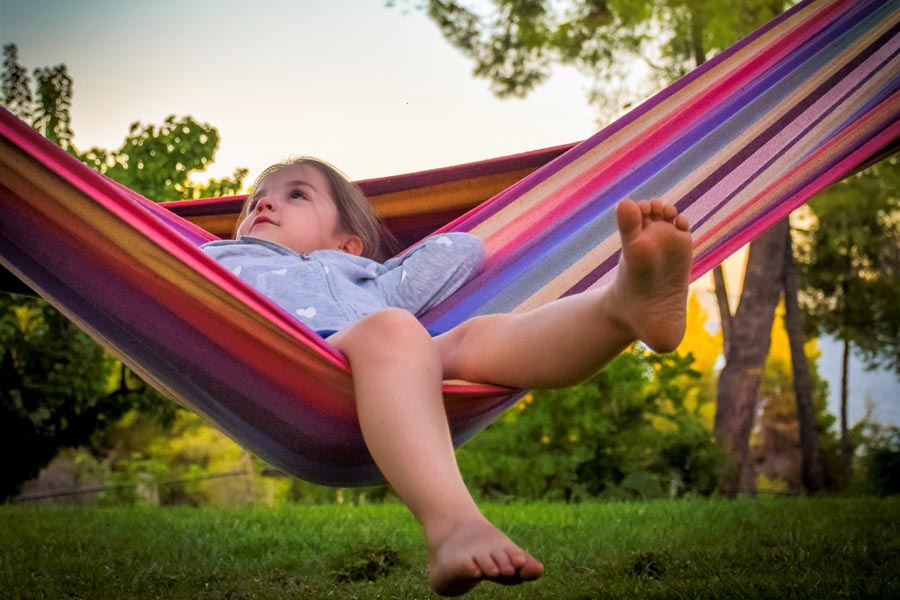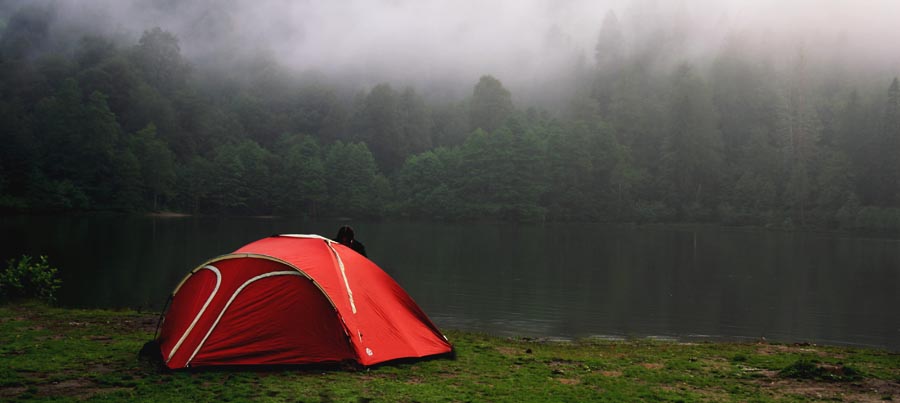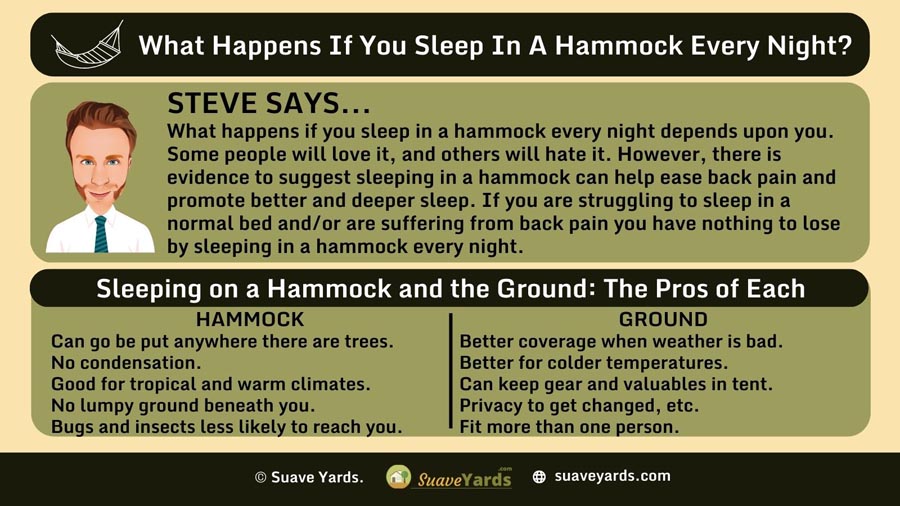
So what does happen if you sleep in a hammock every night?
Is it good for you? Is it bad for you? Will you sleep better or will you sleep worse?
Maybe you suffer from back or neck pain. Will it help this or hinder it?
If you are considering switching to sleeping in a hammock long-term these might be some of the questions that spring to mind.
So let’s take a closer look at whether it is ok to sleep in a hammock every night.
What happens if you sleep in a hammock every night depends upon you. Some people will love it, and others will hate it. However, there is evidence to suggest sleeping in a hammock can help ease back pain and promote better and deeper sleep. If you are struggling to sleep in a normal bed and/or are suffering from back pain you have nothing to lose by sleeping in a hammock every night.
Hammocks: A Brief History
There is some debate over the history of hammocks. Some attribute their invention to the Greek orator and general Alcibiades, whilst others trace their history back to the Mayan civilization.
One thing that is certain is that hammocks have been around for hundreds and probably even thousands of years.
And to this day they are still hugely popular in particular parts of the world, most particularly Central and Latin America.
Certain cultures have long been sleeping in hammocks on a regular basis, and that in itself should answer the question of if you can permanently sleep in a hammock.
But, let’s take a closer look at the main question…
Is It Ok To Sleep in a Hammock Every Night?

The shorter answer is yes, it is absolutely fine to sleep in a hammock each night.
But, like anything, it won’t be for everyone and if you have been sleeping in a bed your entire life you shouldn’t expect to jump into a hammock and start sleeping soundly from the get-go.
It will take some getting used to.
Expect a few days/weeks of adjusting your setup and getting used to an entirely different way of sleeping.
But when you have got used to it, it can have a number of benefits:
Benefit #1: It Can Alleviate Back Pain
When you get your sleeping position right on a hammock, it can relieve back pain.
The recommended way to sleep on a hammock is to lay diagonally across the center line, which creates a flat surface along the body.
Combine this with the fact that there are no pressure points on your body when you sleep in a hammock and it can help ease back and neck pain.
If you Google whether sleeping on a hammock can help back pain, here are a few genuine responses you will find on hammock forums:
“Been sleeping in a hammock full-time for a year-and-a-half now, best sleep of my life! I can’t go back to a bed. My back feels amazing every morning and I sleep soundly through the night.”
“This past weekend I spent my first full 8 hours sleeping in a hammock and woke up in the morning and the first thing that stood out to me was that when I got up I didn’t have any back pain and no issue with movement.”
“Lots of people here (including myself) have found a hammock better for a bad back.
I broke my back in 2002 & had two surgeries.”
“(It) absolutely improved my lower back ‘situation’ which has a dozen different specific diagnoses.”
Benefit #2: It Spreads Your Weight Across a Wide Area
Let’s expand on something we mentioned above, the fact that when you sleep in a hammock there are no pressure points.
Think about it, when you sleep on a bed your body is conforming to the surface below it.
When you sleep in a hammock, the hammock conforms to your body.
Your weight is spread out across the entire area, and there are no points of pressure put on particular spots should as shoulders, hips or your back.
The pressure is spread out equally which is good for your body.
Benefit #3: You Achieve the Ideal Sleeping Position
According to the American Academy of Sleep Medicine, the best sleeping position is on your back with your head elevated about 10 to 30 percent above the rest of your body.
And that is the exact position a properly adjusted hammock will put you in.
Dr. Steven Park says this position allows for optimal blood circulation in the brain and the most unobstructed breathing.
Benefit #4: You Could Sleep Better
The emphasis here is on the ‘could’ because, if you have never slept in a hammock before, it might take a while to get used to it.
But once you do there is evidence to suggest you will get to sleep more easily, and then sleep more deeply.
This is partly because you are in the optimal sleeping position as mentioned above, and also because the light swinging of a hammock can synchronize the hemispheres of the brain and facilitate internal sleep rhythms.
There are scientific studies that back this up too carried out by Swiss researchers.
Can A Child Sleep In A Hammock?

The answer to this question very much depends on how old the child in question is.
If you are talking about very young children and babies, then the evidence suggests that baby sleep hammocks are not a good idea.
Dr. Gina Posner, a pediatrician at MemorialCare Orange Coast Medical Center in California explains:
“[Hammocks are] an extremely dangerous sleep surface. Numerous studies have shown that to decrease the risk of SIDS, the baby needs to sleep on his or her back on a flat, firm surface. The crib hammock is neither firm or flat and that can cause the baby to become entrapped in it if he or she rolls.”
Dr. Gina Posner, Pediatrician at MemorialCare Orange Coast Medical Center
And she is backed up by three more eminent names in the field of pediatric sleep:
“There isn’t enough research proving the safety of the device for unsupervised sleep.”
Eva Klein, certified infant and child sleep consultant and the owner and founder of My Sleeping Baby.
“These products are largely untested in a scientific manner.”
Riki Taubenblat, Certified pediatric sleep consultant at Baby Sleep Maven.
“They have really not been studied. We don’t know a lot about them. Everyone always wants the newest latest and greatest thing and sometimes those aren’t the best things. Until we have new data supporting the idea that sleep hammocks were safe , though I don’t think we’re going to get there, we would certainly change our tune.”
Dr. Jamie Macklin, Pediatric hospitalist at Nationwide Children’s Hospital in Ohio.
If your child is slightly older, around the age of 7 or upwards, then they can sleep in a hammock, but with some caution and by remembering some key points:
- Make sure the hammock isn’t too high, so if your child does fall out of it they don’t hurt themselves.
- If possible pitch the hammock over a clear area, so if they do fall out they aren’t landing on anything dangerous or harmful.
- Make sure the hammock is in reasonably good condition. You don’t want a small tear or hole to be opened up by your child tossing and turning.
- Make sure they have the necessary sleeping bag or quilt to keep them warm.
The main danger is your child falling out, so if you can minimize that you should be good to go!
Is It Better To Sleep In Hammock Or Ground?

So you are going camping and you want to know if it is better to sleep on the ground in a tent or to sleep in a hammock?
Once again this is extremely subjective and comes down to the individual.
If you have tried sleeping on the ground in a tent and hated it, then maybe you might want to give sleeping in a hammock a go, or vice-versa.
Lots of external factors come into play here such as what time of the year it is, where you are going, how much money you have, and how much you are prepared to carry, but there are some basic pros and cons of each.
Sleeping in a Hammock: The Good
So let’s start by outlining the plusses of sleeping in a hammock:
- You can string up a hammock when the terrain is not suitable for camping (providing there are trees).
- It is probably easier to practice ‘Leave No Trace’ with a hammock.
- No condensation. Tents can get feel humid or damp depending upon the conditions. This isn’t a problem with hammocks.
- No rocks or lumpy ground beneath your body.
- Better for tropical climates and summer weather, as you can be out in the open.
- Fewer bugs and insects are likely to reach you in a hammock.
Sleeping in a Hammock: The Bad
But, of course, there are downsides to sleeping in a hammock:
- You need trees of sufficient strength.
- They are generally just for one person.
- There is a learning curve when it comes to getting your hammock set up correctly.
- You will feel cold weather more in a hammock.
- There is less privacy when it comes to getting changed, organizing your gear, etc.
- You can’t bring your gear and valuables inside.
Sleeping on the Ground: The Good
If you decided to camp under canvas and sleep in a tent, it brings its own set of benefits:
- You will be covered much better in the event of bad weather.
- This means that sleeping in a tent will be warmer.
- You can bring your camping gear and valuables inside to keep them safe and dry.
- You have the privacy to get changed, organize your equipment and just hang out by yourself if you want some space.
- Tents can fit more than one person.
Sleeping on the Ground: The Bad
If you are sleeping on the ground, then there are some pitfalls to be aware of:
- Rough and undulating terrain will probably mean a bad night’s sleep.
- You are almost certain to experience some condensation in your tent no matter what conditions you are sleeping in.
- Tents aren’t great for warm, tropical climates largely due to the reason above, as they will often get very hot.
- Tents are more difficult to clean.
Sleeping on A Hammock/The Ground: The Subjective
Then there are a few points that will divide opinion, such as:
- Sleep quality.
- Speed of set up.
- Comfort.
- Weight.
- Cost.
Some people will find they sleep better in a hammock, and some on the ground. Some people will find they can put a tent up quicker than a hammock, and some will find exactly the opposite, and so on.
A lot will depend upon what you are used to, so when it comes to whether it is better to sleep in a hammock or on the ground there is no right answer.
Final Thoughts

So what does happen if you sleep in a hammock every night?
Well, it very much depends on you.
It is highly unlikely to do any long-term damage, and you might find it helps ease back pain and that you sleep better.
In short, if you are finding that you are not sleeping well in a normal bed, then you have nothing to lose by sleeping in a hammock every night.
But don’t expect to sleep like a baby immediately.
Sleeping in a hammock can take some adapting to as it is so different from sleeping on a mattress.
Give it a go and see how you get on!
